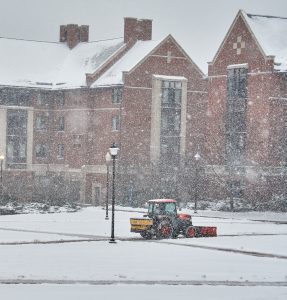
The scientific studies continue to pile up, and confirm the same thing: road salt is causing lots of problems in our streams, lakes and groundwater. The majority of salt applied is sodium chloride, also known as rock salt. In the absence of a new “miracle” deicer, salt will continue to be the most cost-effective product for the foreseeable future. Therefore, the only way to reduce the impacts will be to reduce the amount applied, while still keeping surfaces safe for travel.
Salt washes off the streets and into our soil and waterways. In the soil, it percolates down and changes the soil structure. Too much salt in the soil means plants are unable to grow. We often see dead grass along the roads or sidewalks. High salt content in the soil is often the cause of the dead grass. Salt also enters our water systems and increases salinity levels in our water, even during the summer months. This has detrimental effects on human, animal, and environmental health.
The Green Snow Pro program started at UConn during the fall of 2018. Green Snow Pro is a voluntary salt applicator certification program. Program staff trains municipal public works employees and private contractors. This training includes information about the science of salt, the downstream impacts of salt, how to properly apply salt given weather conditions, and how to calibrate equipment. The program is modeled after the University of New Hampshire’s Green Snow Pro program.
The Connecticut Training and Technical Assistance Center (T2 Center) is the primary leader. They lead the one-day trainings as part of their Road Scholar program. The Center for Land Use Education and Research (CLEAR) collaborates with the T2 Center on other state salt initiatives with UConn educators, regulators, and public works professionals. The class focuses on best practices for salt application and maintenance of public works facilities and equipment. Demonstrations and case studies illustrate the positive impact these strategies can have on communities and operations.
T2 Center staff trained UConn’s facilities staff, and there were substantial reductions in salt use in the first season alone. Green Snow Pro applicators at UConn used over 2,600 less tons of salt, corrected for the number of storms. This resulted in a savings of over $313,000 in salt costs alone. Green Snow Pro’s success highlights education’s lasting environmental benefits. Already, professionals in more than 58 towns statewide have participated in the voluntary training.
We developed a guide, CT Green Snow Pro Best Practices for Municipalities that all municipalities and employees can use. Case studies highlighting the programs success in Ellington, South Windsor, and Manchester were also created and are used in training sessions. Other resources are available on the program website.
“We learned the ways to salt roads versus bridges. It gave us a greater knowledge of salting the road, rather than just going out and thinking it’s good enough,” says Andrew Menard, a course participant from the Town of Manchester Highway Department. “We have mathematical equations now for how many pounds per lane mile to use and that’s really helpful. We now know if the salt we’re applying is doing what we think it’s supposed to be doing.”
Although we cannot fix our salt problem overnight, programs like this offer the best hope to tackle this very serious problem. Visit s.uconn.edu/GreenSnowPro for more information.
Article by Mike Dietz